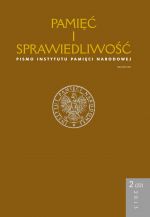Balast po komunizmie. Instytucjonalne rozliczenie komunizmu w krajach Europy Środkowej – opis struktur oraz okoliczności ich powstania
The post-communist burden. Institutional settling accounts with communism in the central European countries – description of structures and circumstances of their emergence
Author(s): Andrzej GrajewskiSubject(s): Politics / Political Sciences, History, Law, Constitution, Jurisprudence, Political history, Social history
Published by: Instytut Pamięci Narodowej
Keywords: decommunization; vetting; settling accounts with the Communism; the security authorities; the acquisition of archives special services; prosecution of perpetrators of communist crimes; clearing debate
Summary/Abstract: After knocking down communism in 1989, Poland and other countries of Eastern Europe were burdened with a task of settling accounts with their totalitarian past both in institutional dimension – through legal compensation for the victims of crimes and persecutions, trying their perpetrators and developing institutional standards preventing functionaries of the former communist secret services and their co-workers from having an impact on public life (lustration) and also enabling the victims to have an insight into the documents collected in the past on them. Since, in the centre of the lustration debate an issue of exploring, developing and settling accounts with one of fundamental pillars of the totalitarian system i.e. former security forces was placed, one of the elements of settling accounts with the communist past was the creation of institutions responsible for taking over the archives of the communist special forces and revealing the network of agents of thepolitical secret service, as well, as conducting research and educational activities in that area. The text analyses the conditions in which that process occurred in Poland and her bordering countries: Germany, the Czech Republic, Slovakia and Russia.The concluding paragraphs of the article contain the assessment that the process of creating the institutions responsible for taking over the materials of the state security organs, their development and making them available was a part of a political ritual of transformation from totalitarianism to democracy. That transformation was experienced by all post-communist countries of Central Europe which chose a democratic variant of social development. The institutions established in order to accomplish that goal have similar competences apart from investigative functions possessed only by the Polish Institute of National Remembrance. Lesser successes were achieved as far as the attempts to legal persecution of the perpetrators of communist crimes were concerned and it relates to the entire geographical area. The state of law proved to be an inefficient tool in bringing the guilty ones to justice within the course of passing years. Settling accounts with communism was never done in Russia. One may think that Russian leaders came to the conclusion that society is not ready yet for such a move since it would entail huge social and political costs and that its full realisation would be possible only after the natural generation exchange has been accomplished. The author puts forward a thesis that a future researcher of the historyof the post-communist era in Europe will be able to clearly distinguish the borderlines of the countries which have settled their accounts with a totalitarian past and of those where this has not been done with all the system, social and moral consequences of that fact.
Journal: Pamięć i Sprawiedliwość.
- Issue Year: 22/2013
- Issue No: 2
- Page Range: 153-182
- Page Count: 30
- Language: Polish

